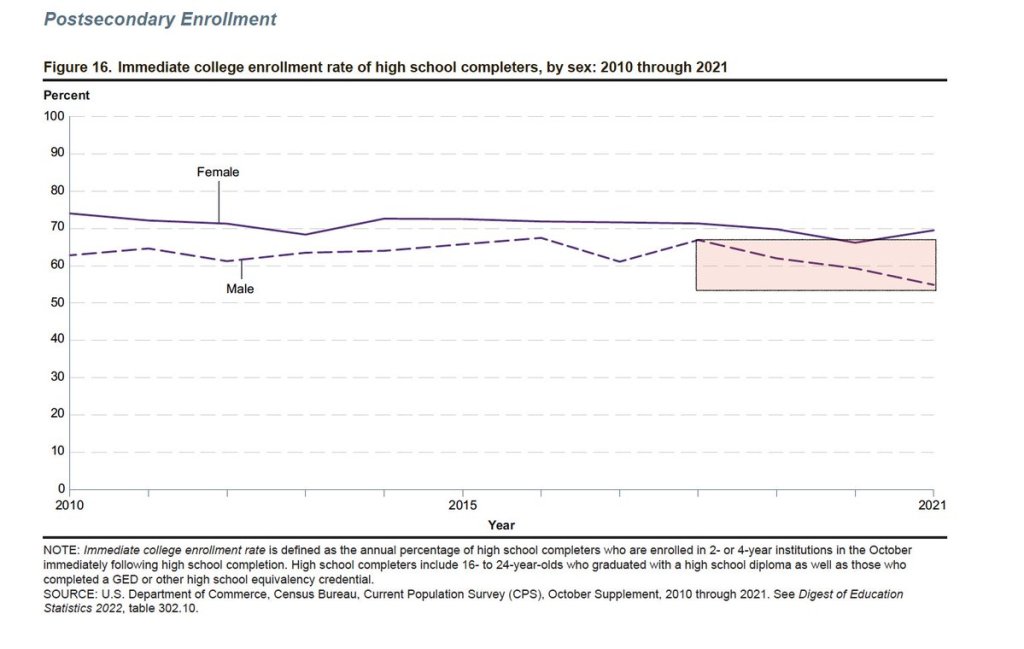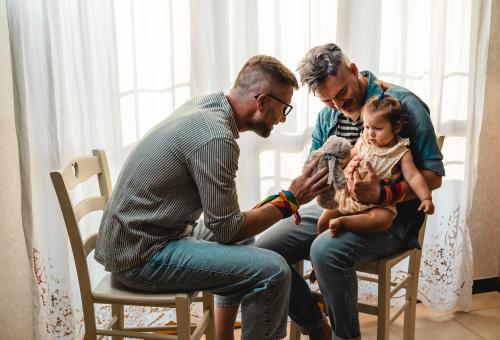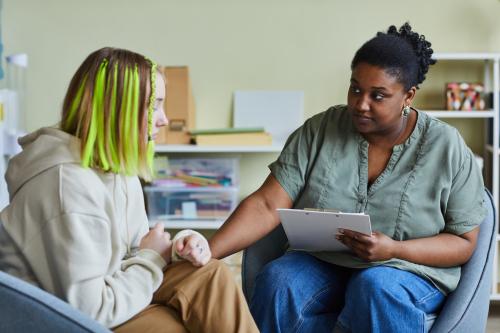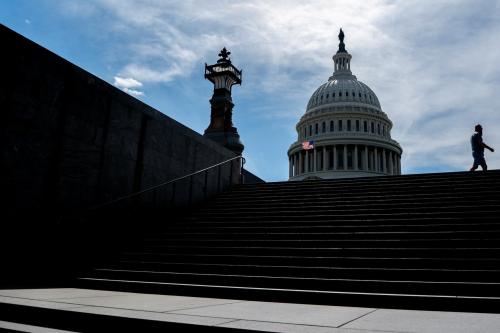If you want more content like this, subscribe to our newsletter.
This week in Class Notes
- My next adventure! The American Institute for Boys and Men.
- Safety net recipients pay more for housing, but it’s better quality.
- Normalization or salutary warning? How teen pregnancy in a peer influences behavior.
- Parental incarceration strains relationships with children.
- Boys are falling further behind girls in college enrollment, as this week’s top chart shows.
- Immigration has been a success story in the United States, even if its political success is murkier, writes Idrees Kahloon in The New Yorker.
- Check out our new report on early childhood education.
- For your calendar: events on the LGBTQ+ data gap, postsecondary education in prison, and a new early care and education workforce center.
Founding a new organization to focus on boys and men
This is the last edition of “Class Notes” from my desk. As of next month, I will be executive director of a new organization I am founding: the American Institute for Boys and Men. Our mission is to research and raise awareness of the problems of boys and men, and advocate for effective solutions. The need for a non-partisan, research-based organization focused on this issue has become clear to me during discussions I’ve had around my book, “Of Boys and Men.” I’ll risk a cliché and say that this is bittersweet. While I’m passionate about the new organization, Brookings has been my professional home for a decade and I have loved my time here. (I don’t want to cut my ties completely, so I’ll still be affiliated as a nonresident senior fellow). To get updates about the new venture, please do sign up for my newsletter and/or follow me on Twitter (Also do check out my TED talk which just came out). The next edition of “Class Notes” will be coming to you from Tara Watson, director of the (soon-to-be-renamed) Center on Children and Families and will, I fear, be better than ever.
Safety net recipients pay more for housing, but it’s better quality
The cost of housing has risen in recent decades. But of course, that might be because it has gotten better. A recent working paper from Erik Hembre and co-authors examines changes in housing quality for recipients of safety net programs such as the Supplemental Nutrition Assistance Program, cash welfare, and Supplemental Security Income. Using the American Housing Survey, they find that the quality of housing for households participating in safety net programs has improved greatly. In 1985, 33 percent of safety net households faced poor housing conditions; by 2021 this share was down to 12 percent. The share of this group in good quality housing rose from one percent to eleven percent over the same time period. Homes got bigger too: the rooms per person increased by 0.29 and average square footage increased by nine percent.
Normalization or salutary warning? How teen pregnancy in a peer influences behavior
Access to contraception, sex education, and a shift in social norms have contributed to a steep fall in teen pregnancy rates. An important question here is how far the experience of seeing a friend or sibling becoming pregnant as a teenager influences behavior. So far, the research on this question has been mixed. Some work suggests it could normalize a teen pregnancy, but other research suggests that it could make teens more cautious from engaging in risky sexual behavior. Using the National Longitudinal Study of Adolescent to Adult Health dataset, researchers Priyanka Anand and Lisa B. Kahn assess the impact of a peer’s teenage pregnancy on an observant’s sexual behavior. The authors find that a teen pregnancy lowers the risk of pregnancy among peer observers, who have fewer sexual partners and are less likely to have unprotected sex.
Parental incarceration strains relationships with children
How does the incarceration of a parent impact relationships with children? A number of researchers have examined the impact of parental incarceration in health, education, and other outcomes. Kristin Turney looks specifically at the impact on the parent-child relationship itself, using Princeton University’s Future of Families and Child Wellbeing Study, a cohort of children born in urban areas around the turn of the 21st century. She finds that parental incarceration, for both mothers and fathers, weakens relationships with children; that relationships with younger children are impacted more negatively compared to adolescents; and that the incarceration of one parent can bring adolescent children closer to their other parent. Given the high rates of incarceration in the United States and ongoing policy debates about criminal justice reform, this research adds important evidence on social costs.
Top Chart: Boys are behind girls in post-secondary college enrollment, and the gap is only growing
Boys are enrolling and graduating from college at much lower rates than girls (see some of our previous work highlighting how girls are more likely to complete high school and graduate college). This week’s top chart from the National Center for Education Statistics’ 2023 Report on the Condition of Education, shows that boys are lagging behind girls in immediate college enrollment. In 2021, 55 percent of boys enrolled in college straight out of high school, compared to 70 percent of girls.

Chart source: Report on the Condition of Education 2023
Choice Opinion: Economists love immigration. Why do so many Americans hate it?
“In the short term, it is easy to despair as nativist backlash recurs once again and borders militarize. But America today has forty-five million foreign-born residents—the most of any country, and as many as the next four combined. And Biden, loudly hawkish on unauthorized immigration, has quietly expanded the number of legal admissions, extending welcome to Ukrainians, Venezuelans, and Haitians fleeing war and chaos. Quietly, too, the economic dividends will accrue,” writes Idrees Kahloon in The New Yorker.
Self-promotion: What does existing research tell us about early childhood education and what do we still need to know?
Policymakers, including the Biden administration with Build Back Better, have long been interested in improving access and quality in early childhood education (ECE). In their new report, Isabel Sawhill and Morgan Welch review the existing literature of ECE programs and use the Social Genome Model to deepen our understanding of the potential impact of these programs. The simulations show that for long-term success, cognitive skills are more important than behavioral skills and that math is more important than reading. They find large racial and gender differences in school readiness at age five, with girls and white children being more likely to be school-ready than boys and Black and Hispanic children. Children who are above 200 percent of the federal poverty line are more likely to be school ready across all race and gender groups. To learn more about existing research on early childhood program evaluations and full results for the model simulations, check out the full report.
For your calendar: events on the LGBTQ+ data gap, postsecondary education in prison, and a new early care and education workforce center
Unveiling the data gap: Understanding the socioeconomic wellbeing of LGBTQ+ Americans
The Brookings Institution
Monday, June 26, 2023, 1:00 PM – 2:00 PM EDT
Prison Research Meets Practice: A Conversation on Postsecondary Education in Prison
Urban Institute
Tuesday, June 27, 2023, 2:00 PM – 3:00 PM EDT
Introducing the National Early Care and Education Workforce Center
Child Trends
Tuesday, July 25, 2023, 12:00 PM EDT
The Brookings Institution is committed to quality, independence, and impact.
We are supported by a diverse array of funders. In line with our values and policies, each Brookings publication represents the sole views of its author(s).








